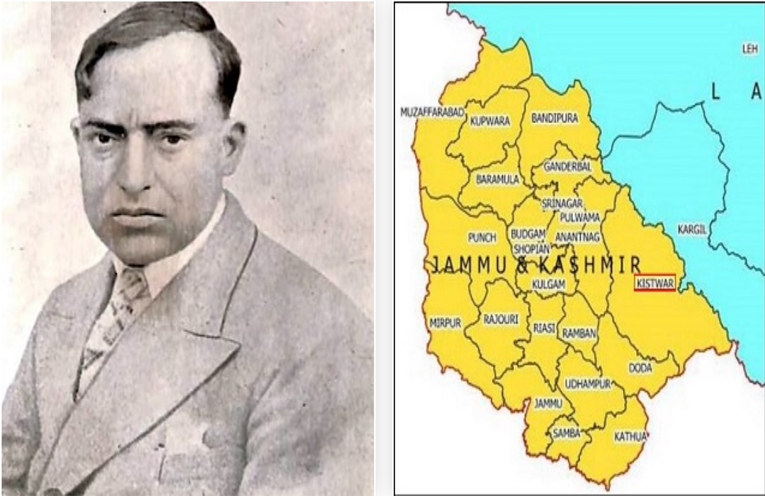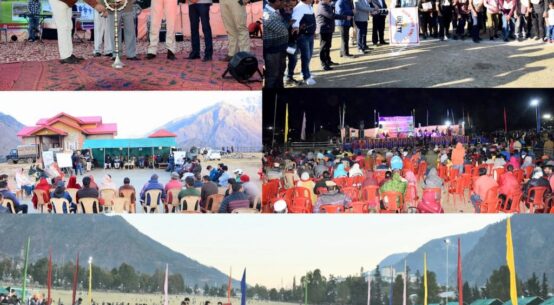
Duni Chand Mehta – Unsung Heroes of Kishtwar Jammu and Kashmir
Duni Chand Mehta was the direct descendant of a line of distinguished Vaidas of district Kishtwar who even served the royal court. He was the Assistant Governor of Kashmir. Later, in July 1947, he was appointed as Wazir-e Wazarat of Muzaffarabad – a north-western border town, which formed a part of Jammu and Kashmir State before the Pakistan-led tribal raids.
As soon as Mr. Mehta joined the new posting as Wazir-e Wazarat of Muzaffarabad, tensions due to partition gradually started becoming acute on the border. Being a border town, threatened with the apprehensions of a tribal attack breaking out anytime, people had already started shifting from Muzaffarabad to the nearby towns and villages. Mr. Mehta was also asked to shift his children to Srinagar and himself shift to Domel which was quite safer with the availability of communication, in case some emergency arises. Mr. Mehta boldly refused the proposal as his sense of duty didn’t allow him to do so. Moreover, he had the orders to forbid the people to flee from Muzaffarabad in fear and panic, therefore, it would have been unjustified to shift his own family.
A few days before the Pakistani tribal attack, Duni Chand Mehta along with the colonel and a company of soldiers assisting him was constantly rushing from one part of the border to another, trying to erect fortifications, should anything untoward might happen anytime. On the fateful day of 22 October 1947, when the Pakistan army-led tribal raiders crossed the borders and entered the city of Muzafarabad, Mr. Mehta immediately left his bungalow and was accompanied by the Superintendent of Police, a sub-Inspector, and twenty-three sepoys set out to ward off the raiders attack. Some of the Dogra soldiers who were stationed for the purpose deserted and joined hands with their coreligionist attackers. Though the local Muslims as well as the sepoys warned Mr. Mehta about the approaching danger of the Pakistani invaders, the bold wazir didn’t pay any heed to their warning as he was anxious to discharge his duties and determined to fight and defeat the Kabalis. Giving a call in the name of the motherland, Mehta Ji urged the locals to be united and assist him and his forces in organizing some sort of defence of the territory against the marauding Pakistani raiders.
However, the terror-stricken people were reluctant to face the approaching death. They started sneaking away quietly and deserted the wazir who was left with a handful of sepoys, too less to be of any use. While the wazir was away and somehow trying to defend the raider’s attack, the tribal raiders entered his residential bungalow. In disgust and with a feeling of duty towards his own family, Mehta Ji gave up and rushed back to his bungalow. However, in fear and panic caused due to the approaching danger, his wife Smt Krishna Mehta along with the six children had already been shifted to take refuge at some safer place. Though Mr. Duni Chand Mehta was warned by his servant about the presence of sixty raiders inside the bungalow, being affirmed in his decision, he refused to budge and displaying great courage Mehta Ji entered the bungalow single-handedly. As soon as he entered, the tribals drew their guns at him and asked him to reveal his religious identity. Mr. Mehta was advised by the locals to save himself by concealing his identity but he refused to act cowardly.
As soon as he exposed his true identity, the raiders fired at him one after the other and shot him dead. Thereafter, the Kabalis set the bungalow on fire in which the body of the martyr wazir was also got cremated. The Pakistani authorities had heard about his bravery and honesty and wanted him to be caught alive. It is said that after his death even the Kabalis were heard saying that Mehta was a very brave officer and was ordered to be kept alive. However, the fearlessness and the boldness with which he faced the raiders provoked them so much that they shot him dead. Mehta Duni Chand was a brave officer neither who gave up his religion in fear nor did he fail in his duty towards the nation. The reverence with which his martyrdom is still remembered is an homage to a sincere officer and a defiant man who bravely faced his death.

